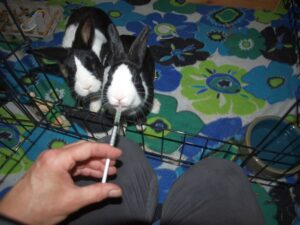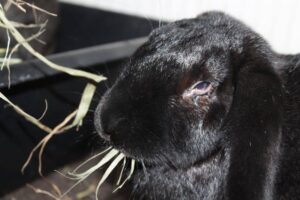Overview
It is critical to examine your rabbit frequently for signs of illness or changes in health. Because they are prey animals, rabbits will hide signs of illness until it is too late. Symptoms include unusual lumps or bumps, fur loss, abnormally small feces, diarrhea, gas or gurgling in the gut, inability to defecate, hunched appearance, prolonged sitting in litter box, odd posturing when attempting to urinate, sudden inability to consistently use the litter box, loud grinding of teeth, constant head-shaking and/or head tilting to one side. Any of these is a medical emergency and requires a veterinarian immediately. WHRS maintains a list of veterinarians familiar with rabbit health. We strongly recommend locating an experienced rabbit vet in advance, before an emergency occurs. It is also good to have a back-up vet. Don’t be afraid to ask your vet questions: how many rabbits do they see each month? How many spay/neuters have they performed? Are they aware that not all antibiotics are suitable for rabbits?

Vaccination
RHDV is a virus that is spreading across the United States and is deadly to rabbit, both domestic and wild. RHDV can be easily brought into the home by humans and other animals, so we highly recommend rabbits to get the RHDV vaccine to protect them against this deadly disease. For more information on this disease, please check House Rabbit Society’s website.
Picking Up Your Rabbit
Rabbits have surprisingly delicate bones. Combined with their strong hindlegs, it is easy for a rabbit to struggle when being handled and break its back with a single kick. Pick up the rabbit by scooping one hand beneath the chest and the other supporting the hindlegs and hips. Quickly bring the rabbit against your body and hold the rear-end firmly; they will struggle less if they feel secure. Another trick is to lift the front legs just before the hindlegs, as it reduces the rabbit’s ability to steer and hop away. Never pick up your rabbit by the ears or neck scruff. Small children should never pick up or hold a rabbit. Most rabbits do not like to be picked up or cuddled; they prefer being petted while safely on the floor or on the sofa next to you.
More explanation on how to pick up your rabbit
Gastrointestinal Problems
Heath problems in rabbits often affect their intestinal tracts, which causes them to stop eating. And when food stops moving through the gut, it rapidly becomes fatal. This is because rabbits get nutrient energy from bacterial digestion in a specialized gut compartment called the cecum. When food no longer moves through the gut (gut stasis), the wrong bacteria (e.g. Clostridium botulinum) will grow and can kill your rabbit within 24 hours. Cessation of gut motility is a medical emergency! Seek a vet immediately if your rabbit has a lack of appetite for more than 24 hours!
Watch your rabbit’s feces daily for any reduction of size or cessation of output. By the time the rabbit becomes lethargic, the condition has probably existed up to a week. In this case, the rabbit needs a vet immediately. An experienced vet may treat this emergency with a combination of force-feedings, subcutaneous fluids (to rehydrate the gut), and/or gut propulsants. Surgery is a last resort and is generally prescribed if the condition has been allowed to progress too far. The best treatment is prevention: unlimited hay and plenty of exercise.
Teeth
Rabbit teeth can grow an inch per month! Rabbits must constantly wear down both incisors and molars. Hay, dried apple branches, untreated wood toys, and thick cardboard are all good for keeping teeth short. Problems arise when teeth grow out of alignment. A veterinarian can file the teeth with a special tool to be even and prevent mouth sores; it may take 3-4 trips to bring the constantly-growing teeth back into alignment. Some rabbits may need periodic filing of their teeth. Broken incisors can grow back if the root is not damaged; if permanent damage has occurred due to accident or genetics, your veterinarian can help with surgical options. We know many rabbits who have lost their front incisors to malocclusion. None have problems with eating, because they can easily lap up pellets with the tongue; however, they may need their vegetables chopped into smaller pieces. Tooth problems should be suspected whenever appetite is reduced (e.g. rabbit stops eating hay, then veggies, then pellets), if the chin is continuously moist or there is mouth drooling, when there is excess water drinking, or if there are ocular or nasal discharges that don’t respond to antibiotics.
Weepy Eye

Unlike most animals, rabbits have only one duct draining the eye, and this is easily blocked by infection or tear debris; this can result in a weepy eye and fur loss. Prompt veterinary care is necessary to keep the blockage from becoming permanently closed due to scarring, and treatment generally consists of flushing the duct under light anesthesia followed by appropriate antibiotics.
More information on Dacryocystitis
Respiratory Illness
Rabbits, like all animals, harbor a variety of bacteria in their respiratory tract. While a majority of respiratory illnesses in rabbits are caused by bacteria, contrary to popular belief, most are not caused by Pasturella. If your rabbit exhibits a respiratory infection, we strongly recommend seeking a veterinarian, who will take a culture, identify the infecting agent, and prescribe the correct antibiotic for treatment. If left untreated, respiratory infections can worsen to pneumonia, head tilt, or abscesses in tissue or bone. Respiratory or ocular discharges are sometimes indicators of hidden molar or incisor problems, and tooth condition should always be checked as well.
Head-Tilt
As with respiratory illness, this infection of the inner ear is treatable with the correct antibiotic. A culture-and-sensitivity test must be performed to identify the correct antibiotic for treatment. Many rabbits have been successfully cured of head-tilt. Patience is required as generally 4 weeks of treatment is required to see an effect. Most rabbits recover with complete or near-complete restoration of balance; physical therapy may be helpful as well.
Antibiotics
Never use antibiotics on rabbits without supervision by an experienced rabbit vet. This is because the rabbit gastrointestinal tract depends on the right population of bacteria to digest the food for energy; the wrong antibiotic can wipe out these good bacteria and kill your rabbit in 24 hours! In particular, rabbits should never be given oral pencillins, such as Amoxicillin.
